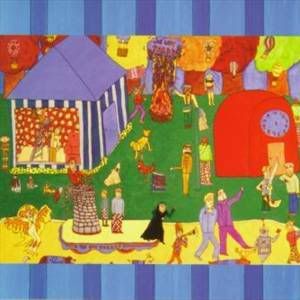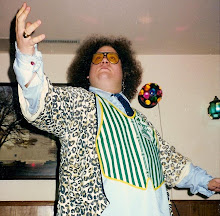Selling secrets to a canned tomato
Tomorrow: new songs in the player. It's not winter anymore.
 Of Montreal
Of Montreal
The Gay Parade
(Bar/None, 1999)
After some reflection, I realized that some comments in yesterday's hastily-typed post may have made me seem real down on indie pop. That's not true at all. After all, I spent last night enjoying the elaborately shabby glamour of Parenthetical Girls, while you did not (the Abbey was sadly too empty for you to refute me). I will admit that I have a slight problem with the word "indie," though, as it seems to have become a synonym either for "eccentric," which doesn't really fit when applied to a bog-standard singer/songwriter, or for "amateur," which could not be further from the truth when applied to bands like Modest Mouse or Interpol - both currently signed to major labels, mind you, making the term's original "independent" implication even murkier. A listener is ostensibly supposed to give an indie band leeway if they're less than polished - a poor recording, instrumental mistakes or off-key vocals are clues that you are not listening to radio product designed by cynical executives who do not even like popular music. (Tangentially, this conceit is also a component of modern black metal, as bands with properly mixed albums and precise playing are often deemed less "true" than some dude recording fifteen meandering guitar solos per week in his bedroom.) The truth is that in many cases, the trappings of "indie" are exploited by insular hacks hoping their codefied quirks will mask a dire lack of creativity, melody or relevance. At the same time, those gifted with songwriting acumen, genuinely unique outsider ideas and technical creativity are the ones defining those quirks in the first place, and they use "shortcomings" as an aesthetic advantage.
Take Of Montreal. Eight LPs and countless EPs, split singles and compilations into their career, they still remain signed to an independent label (downstate mainstay Polyvinyl), and none of the admittedly small portion of that which I've heard sounds like shit. I first heard them a long time ago, back when I first flipped out over Neutral Milk Hotel and Olivia Tremor Control and was trying to check out all of the tangential Elephant Six bands. Before I moved, I had a coupla mp3s from Of Montreal's third album, The Gay Parade, and they sounded okay. The next time I head Of Montreal was at Lollapalooza last summer. I walked by and watched about two minutes before I had to be off to somewhere. They sounded completely different, still very bright and poppy, but now with a bouncy new wave synth-pop slant. Those two minutes were okay, too, but they compelled me to get The Gay Parade and verify whether my memory was faulty. I really should have gotten it sooner, because it's a beautiful piece of work. In true E6 fashion, Kevin Barnes and crew fill up just about every nook and cranny with just about every instrument you can think of, all in the service of dreamy, ultra-twee stereophonic pop that often sounds a lot like The Beatles' old-timey tunes - think of Paul compositions such as "When I'm Sixty-Four" or "Rocky Raccoon." The recording has analog warmth, but doesn't sound like it's been soaking in flood water for six months.
Now, you can listen to Of Montreal's entire new album, Hissing Fauna, Are You the Destroyer?, streaming here. It's got some really catchy songs and some neat tricks, but it doesn't hold a candle to the starry-eyed retro charm of The Gay Parade. Barnes has reportedly written and recorded the bulk of the recent Of Montreal albums on his own, as opposed to the earlier records which were more "band" records. This is an inversion of how the process is supposed to work: your early, solo recordings are lo-fi and self-indulgent, while your later material shows the influence of a collective, expanding the original notion into something grander and more mature. Parade character sketches like "Jacques Lamure," the story of a frustrated guy who does nothing about his situation, or the self-explanatory "A Man's Life Flashing Before His Eyes While He and His Wife Drive Off a Cliff Into the Ocean" are much more engaging than the occasionally shrill, synthetic and navel-gazing stuff that clutters the new album. The weird lyrics on Parade (see the title of this post, from "Tulip Baroo") help paint a colorful mental picture, while those on Fauna are just confounding. Bottom line, if you want a candy-flavored, wild and addictive good time with more possibilities than the first day of summer, get yourself a copy of The Gay Parade. There isn't a bad song on it.
 Of Montreal
Of MontrealThe Gay Parade
(Bar/None, 1999)
After some reflection, I realized that some comments in yesterday's hastily-typed post may have made me seem real down on indie pop. That's not true at all. After all, I spent last night enjoying the elaborately shabby glamour of Parenthetical Girls, while you did not (the Abbey was sadly too empty for you to refute me). I will admit that I have a slight problem with the word "indie," though, as it seems to have become a synonym either for "eccentric," which doesn't really fit when applied to a bog-standard singer/songwriter, or for "amateur," which could not be further from the truth when applied to bands like Modest Mouse or Interpol - both currently signed to major labels, mind you, making the term's original "independent" implication even murkier. A listener is ostensibly supposed to give an indie band leeway if they're less than polished - a poor recording, instrumental mistakes or off-key vocals are clues that you are not listening to radio product designed by cynical executives who do not even like popular music. (Tangentially, this conceit is also a component of modern black metal, as bands with properly mixed albums and precise playing are often deemed less "true" than some dude recording fifteen meandering guitar solos per week in his bedroom.) The truth is that in many cases, the trappings of "indie" are exploited by insular hacks hoping their codefied quirks will mask a dire lack of creativity, melody or relevance. At the same time, those gifted with songwriting acumen, genuinely unique outsider ideas and technical creativity are the ones defining those quirks in the first place, and they use "shortcomings" as an aesthetic advantage.
Take Of Montreal. Eight LPs and countless EPs, split singles and compilations into their career, they still remain signed to an independent label (downstate mainstay Polyvinyl), and none of the admittedly small portion of that which I've heard sounds like shit. I first heard them a long time ago, back when I first flipped out over Neutral Milk Hotel and Olivia Tremor Control and was trying to check out all of the tangential Elephant Six bands. Before I moved, I had a coupla mp3s from Of Montreal's third album, The Gay Parade, and they sounded okay. The next time I head Of Montreal was at Lollapalooza last summer. I walked by and watched about two minutes before I had to be off to somewhere. They sounded completely different, still very bright and poppy, but now with a bouncy new wave synth-pop slant. Those two minutes were okay, too, but they compelled me to get The Gay Parade and verify whether my memory was faulty. I really should have gotten it sooner, because it's a beautiful piece of work. In true E6 fashion, Kevin Barnes and crew fill up just about every nook and cranny with just about every instrument you can think of, all in the service of dreamy, ultra-twee stereophonic pop that often sounds a lot like The Beatles' old-timey tunes - think of Paul compositions such as "When I'm Sixty-Four" or "Rocky Raccoon." The recording has analog warmth, but doesn't sound like it's been soaking in flood water for six months.
Now, you can listen to Of Montreal's entire new album, Hissing Fauna, Are You the Destroyer?, streaming here. It's got some really catchy songs and some neat tricks, but it doesn't hold a candle to the starry-eyed retro charm of The Gay Parade. Barnes has reportedly written and recorded the bulk of the recent Of Montreal albums on his own, as opposed to the earlier records which were more "band" records. This is an inversion of how the process is supposed to work: your early, solo recordings are lo-fi and self-indulgent, while your later material shows the influence of a collective, expanding the original notion into something grander and more mature. Parade character sketches like "Jacques Lamure," the story of a frustrated guy who does nothing about his situation, or the self-explanatory "A Man's Life Flashing Before His Eyes While He and His Wife Drive Off a Cliff Into the Ocean" are much more engaging than the occasionally shrill, synthetic and navel-gazing stuff that clutters the new album. The weird lyrics on Parade (see the title of this post, from "Tulip Baroo") help paint a colorful mental picture, while those on Fauna are just confounding. Bottom line, if you want a candy-flavored, wild and addictive good time with more possibilities than the first day of summer, get yourself a copy of The Gay Parade. There isn't a bad song on it.



0 Comments:
Post a Comment
<< Home